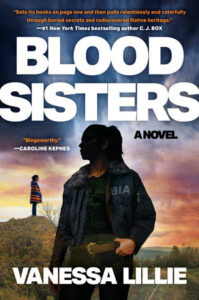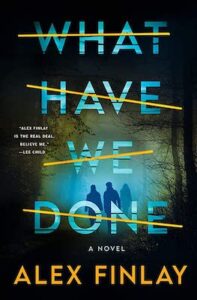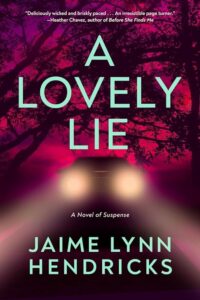Dear Mom: I’m sorry. I’m sorry for all the bad things I did in high school when you thought I was studying.
A scorching trope in thrillers is someone doing something in the past that catches up to them as an adult. Why is this so popular? Because most of us were easily able to get away with crimes when we were in high school, whether it was stealing a piece of candy from the corner drug store, cheating on a test, drinking underage, or, in thriller novels, it’s usually murder.
In A Lovely Lie, we have best friends, meek little Scarlett and Queen Bee Pepper, who were involved in a car accident at the end of their senior year on the west coast of Florida. Two classmates ended up dead. With no one to track them, no damning text message threats, and trust from their parents, they were able to manipulate their way out of it when questioned by police. All they had to do was stick to the story and it would all look like an accident. The case was cut and dried and closed in record time.
They got away with it. But did they? Pepper disappeared to New York a couple days later and left Scarlett to stick to the story for the rest of her life. Twenty-two years later, Zoey shows up—Pepper’s daughter—with a cryptic letter addressed to Scarlett from all those years ago. Pepper has recently died, and now Zoey is left with a million questions about what really happened that night, not only about how the two teenagers died, but why. It sets up a roller coaster ride for the truth, and it becomes difficult for Zoey to navigate the moving parts because back then, everyone was lying. Right now, they are too.
Are there a bunch of homicidal teenagers running around, killing someone for cheating on them, or wearing the same prom outfit, or just being a bully? Gosh, I hope not. But we see it all the time in thrillers. As a hardcore Gen Xer, I always had to listen to my mother tie herself in knots over that proverbial ditch by the side of the road I’d end up in if I didn’t play by the rules. My high school years were a changing of the times—my radio dial went from Motley Crue and Poison, painting sparkles on myself and teasing my hair, right into Nirvana and Soundgarden, where flannels and flat hair were all the rage. The only thing that stayed consistent was the freedom. There were no cell phones, no facial recognition cameras, no car tracking devices … we were all trusted by our parents to be at the dinner table when the streetlights came on. It was a much more innocent time, and as I think back, it was a perfect time to get away with murder. Not that I’m like that. Right, mom? Sure, I snuck peeks at test answers and cut a class here and there, but I was no murderer. That mom knows of, anyway.
There are a few books that bring the past back into adulthood flawlessly. The characters hope to keep their crimes hidden in a tiny little box and hope it stays closed until, of course, that inciting incident tears the lid off everything we thought was true.

In Blood Sisters by Vanessa Lillie, we have Syd Walker, a Cherokee archaeologist for the Bureau of Indian Affairs, who has moved on from her Oklahoma upbringing. As a teenager, she was attacked while with her sister Emma Lou and her best friend Luna. Luna was killed, as was the attacker—him, by Syd’s hand. Now living her adult life in Rhode Island, Syd is disturbed to find out Emma Lou is now missing. Lured back home to once again face the corrupt local government and their dismissal of missing Indigenous girls, Syd sets on a path to locate her sister. Of course, each rock overturned in the chat pile opens another stream of questions since each clue to finding her is inexplicably tied to what happened all those years ago. Gen Xers had no grid to live on, but this atmospheric thriller lets you know that even as technology improves, you can run but you can’t hide, and there’s a way to stay off the grid even now—especially if you want to keep the past buried.

In What Have We Done by Alex Finlay, we’re presented with three childhood friends from Savior House, a place for parentless teens. Jenna, Donnie, and Nico bonded through their trauma and bullying as children, yet somehow grew up to relatively respectable lives (if you believe them!). It’s now twenty-five years later and they haven’t been in touch, but that’s about to change. They all separately get word that another friend of theirs from Savior House, Ben, was killed. Now, (that same?) someone is after them—but why? What was really going on at Savior House that they couldn’t prove as children, and is it still going on? No cell phone, no camera, no way to record the conversations … it became the word of the unruly kids versus the responsible adults. Now, they are armed with easier ways to catch someone slipping up when everything has a record and a time stamp.

This next one blurred the GenX social line: When She Disappeared by Nicole Mabry and Steph Mullin. Upon Margo’s return to her small hometown of Lake Moss for the first time in fifteen years, the news breaks that her missing childhood best friend Jessie’s body has been found at the bottom of their local swimming hole. When a television documentary crew arrives and begins unearthing secrets within Jessie’s high school clique, Margo joins their investigation and must confront old demons. This was a fun one because as we chip closer to the truth, we remember the original crime happened at the very beginning of the iPhone explosion. And wouldn’t it be that very iPhone that led to justice in this instance?—something every homicidal teen should worry about in today’s day and age, if they aren’t planning on getting caught.
To wrap it up, kids will be kids—that hasn’t changed. However, now, almost every indiscretion is caught by someone, somewhere, in pictures or on video. Amateur sleuths come out of the woodwork with podcasts and vlodcasts and blast theories all over social media, whipping everyone into a frenzy with their own ideas about what could’ve happened. Murder is so much less likely to go unsolved if everyone is watching. I promise, your mother has an intuition about these things (yes, Mom, I’m still sorry for sneaking out that time! But see, you caught me). Thankfully, we were just joyriding after curfew, not hiding bodies.
So, don’t lie to your mother. If thrillers are any indication, you won’t get away with your crimes nowadays anyway.
And you just might need Mom on your side.
***
–Featured image: Francesco Hayez, Consiglio alla vendetta, (1851)


















